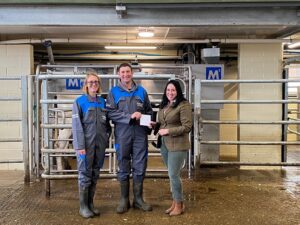Farming is changing, and the industry needs new people with a more open mindset to lead it forward, according to a challenging new report commissioned by the Worshipful Company of Farmers.
The report, entitled ‘Future business leaders in agriculture: Who will lead the industry forward?’ investigates the challenges and opportunities facing the current and future generations in farming and food production, and addresses some of the serious barriers to progression.
Undertaken by Matt Lobley and Caroline Nye at the Centre for Rural Policy Research at the University of Exeter, the report challenges the status quo. It identifies several practical routes to bring in new entrants with fresh mindsets, while also making the most of collaboration, networking and upskilling across the industry to create a shared vision for farming leadership. It is a detailed and practical piece of research that will trigger industry discussion and, hopefully, action.
“Fundamentally, the changing farming environment means the industry needs different types of leaders, and a change in attitude to address the problematic lack of diversity and engrained ways of thinking,” says Richard Davies, Master at the WCF.
“Every industry needs great leaders. The agricultural industry is no different. It faces an unparalleled level of change and challenge, which means that now, more than ever before, it needs to act,” he adds. “It needs to recruit, develop, train, empower, and encourage a new generation of managers with the ability and willingness to see the world differently, to apply learnings from every walk of life, and to lead and manage with real skill, passion and commitment.
“The industry already has some great leaders, but to have the greatest talent pool to choose from, agriculture needs to make itself attractive to as wide a range of potential leaders, from as a broad a spectrum of society, as possible.”
The lack of new entrants is a serious threat to the industry, as is the traditional pattern of succession from father to son, with many successors studying agriculture and rarely leaving the home farm. Instead, they should be more outward-looking, learning business and leadership skills and bringing experiences from other industries, says the report.
It suggests that educational facilities become more inclusive and attractive to non-farming people, with mentorship to help mould new leaders and closer relationships with the Ministry of Defence to bring in new talent. The industry should also work with job centres and on social media, promoting elements that would be attractive to younger, diverse people – like sustainability, technology and agro-ecology.
Networking is key to fostering entrepreneurial thinking and leadership skills, and helps to bring joint ventures together – but a culture shift is needed towards accepting continuing professional development in the sector, notes the report.
“The industry does not simply need new leaders, but new strategies, new understandings, and a change in attitudes. Diversity must be addressed. Gender, ethnic and cultural diversity is associated with improved business performance and is an essential part of moral justice,” it adds.
“Leadership skills required in contemporary agriculture are very different to those required for past generations of managers and leaders. Therefore, strategies to promote and develop new leaders need to be adjusted to meet the challenges faced by the industry and the individuals needed to drive it forward.”
The full report can be downloaded from: https://farmerslivery.org.uk/new-report-future-business-leaders-in-agriculture/






